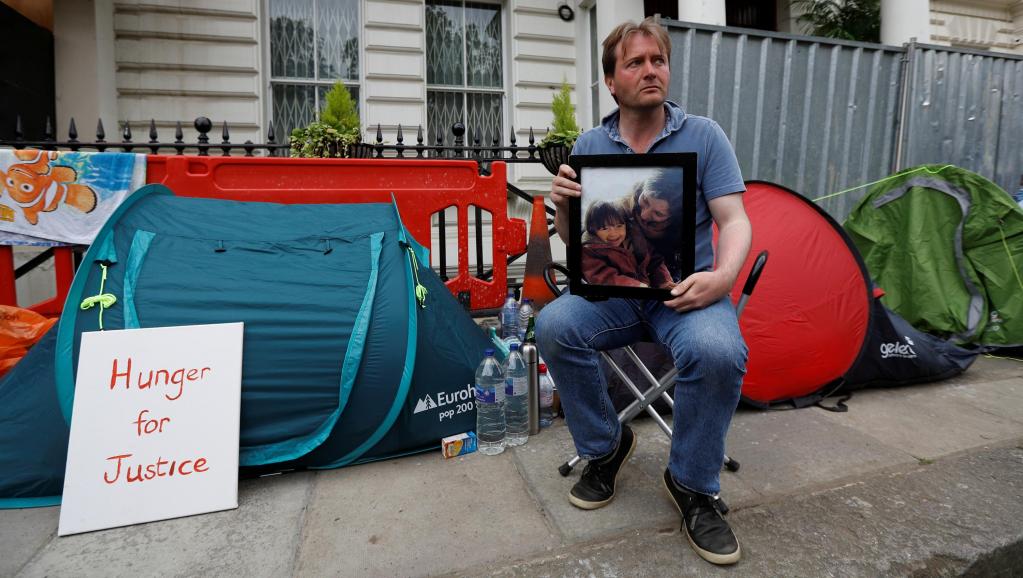Abduction business a profitable string to IRGC’s bow
https://arab.news/6sss7

The tools the Iranian regime uses to address foreign policy issues are multifaceted, depending on the nature of the issue at hand and the opportunities strategized. Regionally, the Iranian regime has deployed brutal militias and terror groups, comprised mainly of criminals wanted by both Western and Arab governments.
Meanwhile, the Islamic Revolutionary Guard Corps (IRGC), a key pillar of the Iranian regime, has found a very profitable tool when negotiating and bargaining with Western countries. This tool involves abducting and imprisoning Iranian dual nationals and foreigners, using them for ransom or political leverage; though Tehran will, of course, never admit to this.
However, Hassan Abbasi, a former IRGC official and head of the Center for Borderless Security Doctrinal Analysis, has somewhat naively admitted to this criminal behavior. He said this month: “I don’t know how to solve economic issues without a relationship with the West. Do you want to solve the issue? Every naval force or a ship passes, take 10 or 20 American soldiers every month. Take $1 billion for each one. If you take $1 billion every week, it will add up to $51 billion per year. That’s how it is done.”
Iranian dual nationals who reside in the West but return to Iran are potentially lucrative hostages. They can easily be abducted and charged with fabricated crimes before being sentenced or flogged. But this is not limited to dual nationals — even Westerners who travel to Iran can be subjected to this travesty of justice. Following their trials, and in most cases before the court ruling against them is enforced, the Iranian regime allows these individuals to leave the country in exchange for a hefty “bail” deposit that is equivalent to a ransom payment.
Anyone wishing to research this won’t have to look hard to find dozens of such cases. According to a 2017 Reuters article, the IRGC had arrested at least 30 dual nationals in the preceding two years alone, mostly on spying charges.
One well-known detainee is Nazanin Zaghari-Ratcliffe, a British-Iranian citizen sentenced to five years’ imprisonment on charges of “threatening to topple the government” in 2016, shortly after being arrested during a visit to her family in Tehran to celebrate Nowruz (Iranian New Year) with her then-22-month-old daughter.
Her husband Richard Ratcliffe, speaking after his latest meeting with British Prime Minister Boris Johnson last week, said that his wife is being used as a “chess piece” in Iran’s foreign policy, and urged the UK government to be “tougher” with the Iranian regime. Ratcliffe also revealed that, according to his wife, Iranian regime officials had told her that, if she wished to be released, she had to act as a spy for them — an offer she refused.
In May last year, the British government warned British-Iranian dual nationals against all travel to Iran, citing the Iranian political system’s continued arbitrary detention and abuse of dual nationals, as well as of Iranian citizens who have links to UK-based institutions.
Dual nationals of other countries face the same dangers on returning to Iran. Iranian-Americans, including the scholar Kian Tajbakhsh, Radio Farda presenter Parnaz Amina, and the journalist and former Washington Post Tehran bureau chief Jason Rezaian, who was detained along with his wife Yeganeh Salehi, were all imprisoned for periods ranging from months to years before being released in return for a ransom payment.
Amir Mirza Hekmati, an Iranian-American and former US Marine, was arrested during a visit to Iran in August 2011 on charges of “spying for the CIA,” for which he was sentenced to death. In March 2012, Iran’s Supreme Court overturned his death sentence and ordered a retrial on the basis that the verdict against Hekmati was “not complete.” He was released in 2016 and left the country as part of a prisoner swap deal.
Australian-British detainee Kylie Moore-Gilbert, a lecturer in Islamic studies at Melbourne University, has been held in Tehran’s infamous Evin Prison since September 2018. She was arrested at Tehran airport while trying to leave the country after attending an academic conference. She was sentenced to 10 years’ imprisonment on charges of espionage.
Like Zaghari-Ratcliffe, Moore-Gilbert has stated that the IRGC attempted to recruit her as a spy in exchange for her release. She has asserted that her detention has been politicized by the Iranian regime, claiming in a recent letter that, in October last year, IRGC officials discussed with her two appeal scenarios, the first offering her a 13-month sentence (essentially “time served,” which would have seen her released immediately) and the second confirming her original 10-year sentence. IRGC officials told Moore-Gilbert that the appeal court would agree to the first scenario in exchange for her spying for the Iranian regime — an offer she “categorically” refused.
What these cases and so many others confirm is that, for Iran’s regime and its military and security forces, there are no “red lines” — kidnapping, false imprisonment, extortion, coercion and other crimes are simply regarded as standard political tools for self-enrichment and leverage. Iran’s regime will not act like a normal government or state, since it is incapable or unwilling to do so, and has no incentive to do so as long as the international community accepts the status quo.
Iranian dual nationals who reside in the West but return to Iran are potentially lucrative hostages.
Dr. Mohammed Al-Sulami
The Iranian regime is aware of the importance that most nations, especially those in the West, attach to the safety of their nationals, viewing this as a weakness that it can exploit to its advantage.
After acting with impunity for so long, Iran’s regime is not about to change and it will use or exploit these detainees however it can, in order to circumvent sanctions or for any other political purpose. With the number of foreign and dual nationals detained rising, clearly appeasement is simply making the regime bolder in engaging in this lucrative business.
This abduction business is simply another string to the IRGC’s criminal bow, demonstrating that, despite President Hassan Rouhani and Foreign Minister Mohammed Javad Zarif’s eloquent speeches on the international stage, Iran’s regime and the IRGC have abandoned all pretense of civilized behavior and are acting, in effect, as a criminal organization.
- Dr. Mohammed Al-Sulami is Head of the International Institute for Iranian Studies (Rasanah). Twitter: @mohalsulami










































